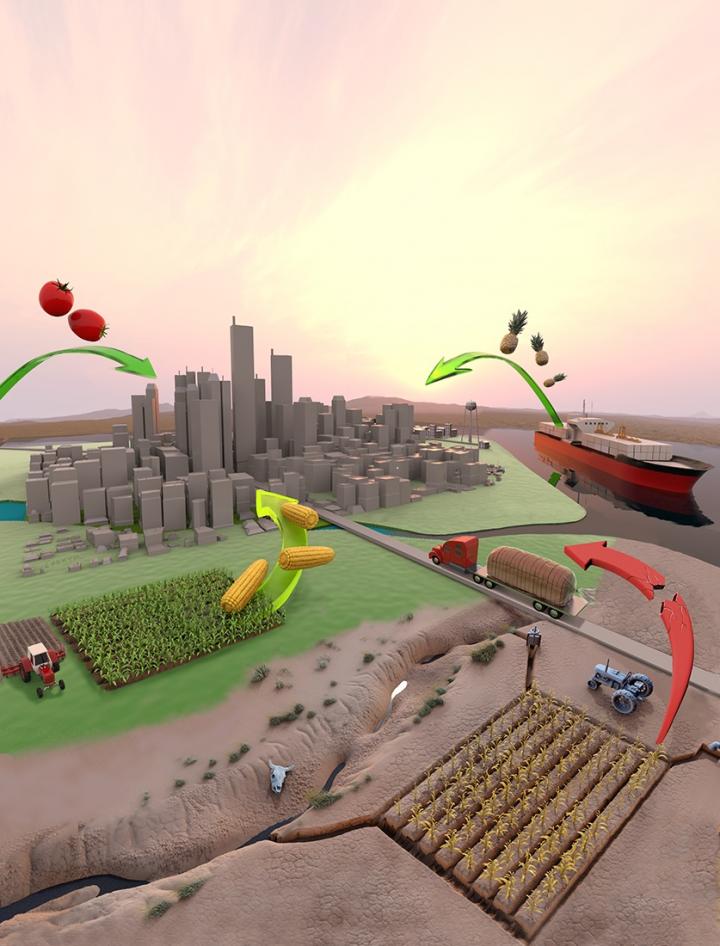Diverse supply chains that mimic ecological systems can more readily adapt to unforeseeable disruptions

Credit: Northern Arizona University
A new paper in Nature lays out the way natural ecosystems parallel U.S. supply chains and how American cities can use these tools to strengthen their supply chains.
The paper, “Supply chain diversity buffers cities against food shocks,” is co-authored by Benjamin Ruddell, director of the FEWSION Project and the School of Informatics, Computing, and Cyber Systems at Northern Arizona University, and Richard Rushforth, an assistant research professor in SICCS, in collaboration with FEWSION project researchers at Penn State. FEWSION is an NSF-funded collaboration that uses comprehensive data mapping to monitor domestic supply chains for food, water and energy down to the county level.
This research looks at the importance of diversity within the supply chain, which helps to reduce damaging disruptions from supply chain shocks. Supply chains work a lot like food webs in natural ecosystems, in which biodiversity allows for adaptation during disruptions. The analogy turned out to be incredibly insightful, particularly in looking at “black swan” events, which are unpredictable and hard to protect against–and for which adaptation, not prevention, is the main defense.
“This is why ecological theory is so important–if we have diverse supply chains that mimic ecological systems, they can more readily adapt to unforeseeable shocks,” Ruddell said. “We can use this nature-inspired design to create more resilient supply chains.”
The study examined a history of food flow data for U.S. cities, questioning whether the diversity of a city’s food supply chain explains the resilience of the city’s food supply to shocks. They found that the diversity of a city’s supply chain explains more than 90 percent of the intensity, duration and frequency of historically observed food supply shocks in US cities.
This model worked regardless of the cause of the shock, which Ruddell said is both profound and practical.
“We now have a simple and effective mathematical basis for policies to boost a city’s supply chain resilience,” he said. “Coming years will reveal how broadly this finding holds for other kinds of supply chains. Does it hold for households? Nations? Electricity? Telecommunications?”
This practical solution can help leads communities to develop resilient supply chains and better supply chain policy. It is particularly important in today’s economy, as the United States has seen several serious threats to critical supply chains nationwide in the last 18 months, including the global COVID-19 supply chain crunch, the Colonial Pipeline and JBS meat processing ransomware attacks, the Suez Canal blockage, the hack of water supplies in Florida and the ERCOT power and water outage. It also is significant as the country heads into hurricane season, as several major ports often are in the direct line of damaging storms.
Additionally, international events have led weakened supply chains in the course of several decades, including the globalization of supply chains, causing an increased reliance on manufacturers in Asia; just-in-time manufacturing and distribution, which leads to reduced inventories; and global price competition, which has concentrated production to one or two huge producers. The Biden Administration has recognized supply chain resilience as a major priority and is setting national goals, which Ruddell said is a step in the right direction, but communities can proactively strengthen their own supply chains as well to help prepare for disaster.
“This finding is also promising for the intellectual synthesis of data science, network theory and ecologically inspired (or nature-based) resilience thinking and argues for further investment in the basic research that led to this practical breakthrough,” Ruddell said. “This method can underpin a new class of federal regulations for critical supply chain security and can be used to make our economy more secure and resilient. We’re excited to see where these ideas take us in coming years. Resilience, based on solid science, is excellent policy for an unpredictable 21st century.”
Interested readers should visit the FEWSION Project website and explore the FEW-View tool, which maps the diversity and resilience of supply chains for U.S. cities.
###
About Northern Arizona University
Northern Arizona University is a higher-research institution providing exceptional educational opportunities in Arizona and beyond. NAU delivers a student-centered experience to its nearly 30,000 students in Flagstaff, statewide and online through rigorous academic programs in a supportive, inclusive and diverse environment. Dedicated, world-renowned faculty help ensure students achieve academic excellence, experience personal growth, have meaningful research opportunities and are positioned for personal and professional success.
Media Contact
Ben Ruddell
[email protected]
Original Source
https:/
Related Journal Article
http://dx.




